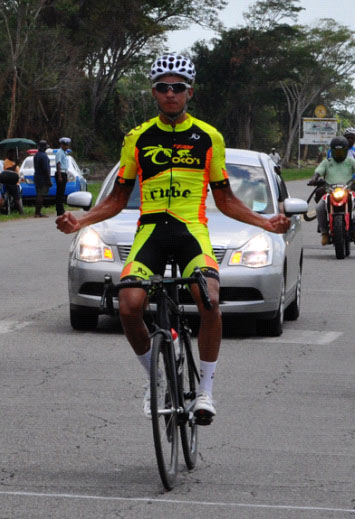Team Coco’s Carlos Ospina’s refusal to take a urine test following the Tour of Guyana on Sunday stemmed from alleged unsanitary conditions.
This is according to President of the Coco’s club, Jerome Allicock.
Allicock told Stabroek Sport yesterday that the Colombian cyclist initially agreed to take a urine test which was conducted by Doping Control Officers (DPO) of the Caribbean Regional Anti-Doping Association but upon seeing the alleged unsanitary conditions of the testing area, he decided not take to adhere in fear of his samples being compromised.
Allicock then added that there is a strong possibility that Ospina might not compete here again since “the rules had nothing about testing.”

However, five other wheelsmen (Raul Leal, Alanzo Greaves, Jamol Eastman, Geron Williams and Marloe Rodman) along with four of Ospina’s club mates (Raynauth Jeffrey, Hamza Eastman, Darren Matthews and Jaime Ramirez) were tested without fear of their samples being compromised.
Stabroek Sport spoke to three of the tested riders who asked to remain anonymous and they all stated that the surroundings would not have contaminated or compromised their A and B samples.
When contacted yesterday, one of the Doping Control Officers, Dr. Karen Pilgrim told this publication “it’s a clear process and no one but the athlete handles their sample until it is sealed in the bottles (A and B samples) and they cannot be mixed up or compromised.”
Quizzed on whether The Caribbean Regional Anti-Doping Association has the authority to test athletes without notice, Pilgrim stated that “every national level athlete should know that you can be tested at any time and any place. Everything that we do is for the well-being of the athlete but there is a time and place, we don’t interfere with things like a medal ceremony or any other meaningful engagements.”
This was reiterated by New UCI Anti-Doping Rules which states that “in order to achieve “smarter testing”, there will be an increased focus on “surprise pop-up testing missions” to enhance the effectiveness and unpredictability of testing, with the majority of the controls carried out by the Cycling Anti-Doping Foundation (CADF), on behalf of the UCI, being made unannounced and, wherever possible, in collaboration with the on-site National Anti-Doping Agency.
Dr Pilgrim then noted that the tests are conducted by specific labs accredited by WADA and that “we may or may not hear anything unless the tests are positive.”
The results are generally disclosed in four weeks.
One of the organizers of the race, Malcolm Sonaram said yesterday that an athlete cannot simply refuse to be tested and he expects Ospina to be sanctioned in some form. “Technically he already committed himself to judgment, you cannot just refuse to take a test.”
Note: The Caribbean Regional Anti-Doping Association is one of the 15 branches around the world that comes under the umbrella of the World Anti-Doping Agency (WADA). The headquarters is the CAR-RADO is in Barbados.





